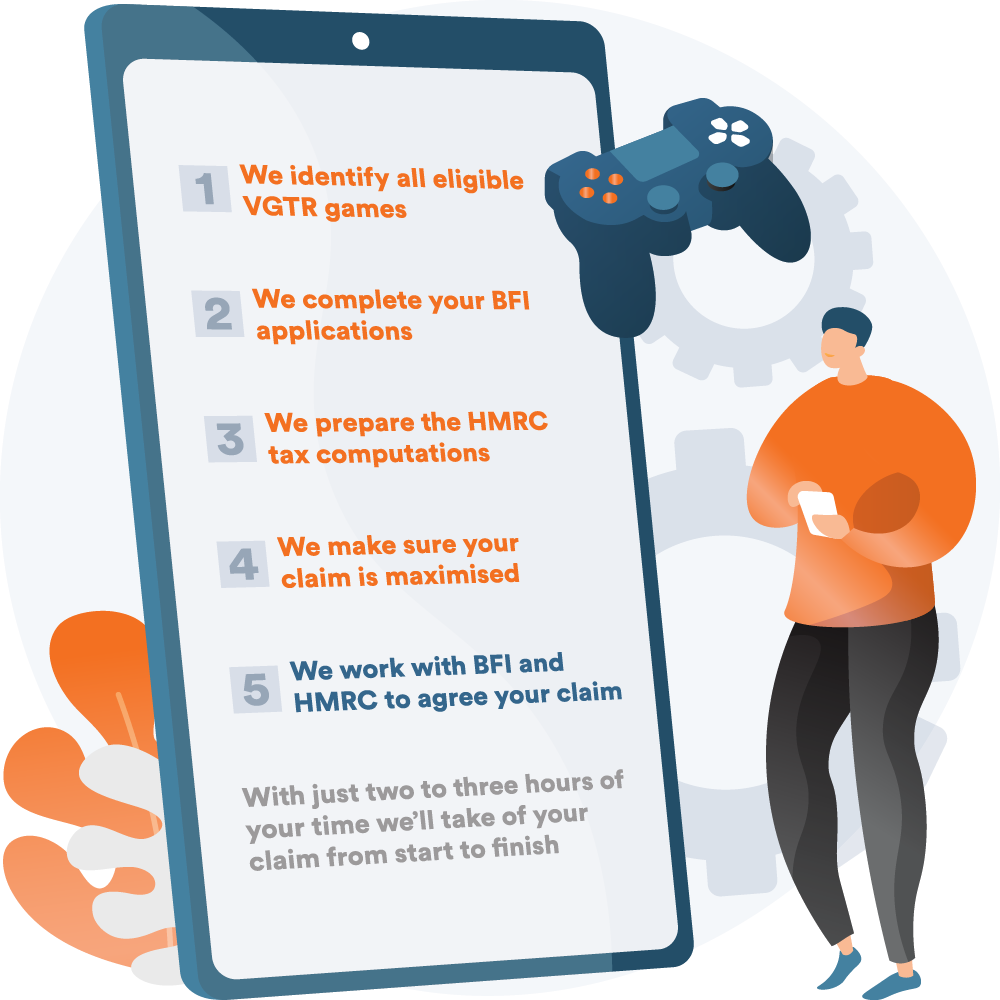Video Games Tax Relief (VGTR) is a government funding incentive that allows digital gaming businesses to claim up to 20% of their core production expenditure. The VGTR scheme is being replaced by the Video Games Expenditure Credit.

Video Games Tax Relief (VGTR) is a tax relief incentive designed to support UK-based game developers. It is available for games that are in production before 1 April 2025.
This means that Video Game Development Companies (VGDCs) can claim back some of their UK development costs at the end of their accounting period and receive either a cash credit or money off their tax bill.


VGDCs can claim back 20% of their core costs, assuming the expenditure is incurred in the UK or the EEA. Core costs include spending on designing, developing and testing the game, once the project has been "green-lit".
Game developers can claim VGTR on whichever is lower:
If the game is profitable, VGTR can be used to reduce a Corporation Tax bill. If the video game makes a loss, claimants can receive a cash payment from HMRC at a rate of 25%.
If you are a UK-registered company and have been developing your own video game, then you will more than likely qualify for VGTR.
Your company must be responsible for the designing, developing, testing, and production of the video game and, therefore, be known as the Video Games Development Company (VGDC).
If two or more companies are working on the same game, only one can apply for VGTR.
A VGDC doesn’t need to take direct responsibility for every aspect of developing the video game, but must have overall accountability for the game.


Video games are eligible, no matter what device they can be played on. Games played on PCs, smartphones, tablets and video consoles are all potentially qualifying.
However, games designed for advertising, gambling or with extreme material cannot be claimed.
Qualifying games must be intended for the general public and must be certified as "British" by the British Film Institute by passing the Cultural Test.
VGDCs also need to spend at least 25% of core costs of development within the UK or European Economic Area to claim for a game.
Video Games Tax Relief is claimed as part of the Company Tax Return (CT600) filed with HMRC. To make a VGTR claim, you’ll need to be company registered in the UK and have the following documents:
You’ll need to calculate if your video game has made a profit or a loss and determine whether your losses should be surrendered for a cash repayment or the VGTR used to reduce your tax bill.


The Video Games Expenditure Credit (VGEC) will replace the VGTR scheme in the coming years. It provides a 34% expenditure credit rate for video games and is available for expenditure from 1 January 2024.
The credit will be treated as income and is taxable at the Corporation Tax rate of 25%. Therefore, the real-world benefit is 25.5% of the qualifying expenditure!
For games that begin production after 1 April 2025, companies will only be able to claim VGEC.
In our latest VGTR eBook, we explain how you can make the most of this valuable government programme.
Our guide will take you through all the steps required to complete and pass BFI's Cultural Test – a key requirement for claiming VGTR. We'll also show you how to maximise your claim and get the most out of this valuable tax relief.
Download our free eBook today and learn everything you need to know about VGTR!

"DR Studios, part of the 505 Group, has worked closely with Myriad since 2018, particularly with Chris Dowsett, who has managed several BFI (British Film Institute) certification applications and subsequent video game tax relief (VGTR) claims for us. Chris is an excellent 'details' man. He's managed both our BFI certification applications and subsequent tax relief claims from start to submission, and we couldn't be happier with the relationship. Chris is backed by the specialist tax team at Myriad, which has years of experience in the creative industry tax relief field. I recommend Chris and Myriad if you're considering a VGTR claim."





Andrew Stephens
DR Studios - Part of 505 Group
"I've worked with Chris Dowsett at Myriad since 2017, identifying qualifying R&D criteria while navigating BFI & HMRC submissions. Chris' knowledge of the entire VGTR process has exceeded my expectations and placed my business in a stronger position. I highly recommend Chris to all my business friends and connections."





Paul Adams
Full Fat Productions
"Chris at Myriad has greatly supported Teach Your Monster over the last five years, working with us to manage our annual VGTR claim for multiple games. His process knowledge is quite remarkable, given the detail and complexity involved. We have a high level of comfort knowing our claims are worked through with great attention to detail and with every area thoroughly scrutinised before submission. This has resulted in significant financial benefits to support our ongoing work developing educational kid's games. Chris is very approachable, always there when you need him, he knows his stuff inside out, and last but not least, he is very pleasant to work with!"





Alison Duddy
Teach Your Monster
"Chris and the team at Myriad did a fantastic job with our VGTR claim. They were fast, supportive and knowledgeable. I would highly recommend."





Martyn Johnston
Upperroom Games
Myriad is your go-to partner for a successful Video Games Tax Relief or Video Game Expenditure Credit claim.
Our experienced team of application specialists, cost accountants, corporate tax experts, and creative tax relief consultants have a reputation for helping UK game development companies unlock maximum value from government funding programs.
GET IN TOUCH

If you want to claim VGEC, your video game must be certified as British. You must pass the British Film Institute (BFI) cultural test to receive this certification.
To pass the BFI cultural test, complete an online application form for each video game for which you want to claim VGEC. The BFI will assess your application and award points based on the cultural content of the game, its cultural contribution, its cultural hubs, and its cultural practitioners. Each video game must score at least 16 out of 31 points to pass the test. You’ll also need to submit some supporting evidence.
The certificate can be “interim” (for productions not yet completed) or “final” (for completed productions). An interim certificate is valid for three years and there is no limit on the number of interim certificates you can receive.
Myriad employs BFI application specialists who can help you pass this test. Contact us for advice.
BFI is currently reporting 10-12 weeks to process submitted applications.
Delays may occur if application forms are not correctly completed or need further information. If you need the certificate by a specific date, make sure you apply in good time and specify your deadline date on the application.
The Accountant's Report is required when an application claims points in Section C and/or Section D. The Accountant's report aims to verify the total and UK expenditure of the work in Section C and the nationality or residence of all persons in Section D.
The Accountant's Report must be prepared by a person eligible for appointment as a company auditor under section 1212 of the Companies Act 2006. A report can cost between £500 and £2,000 per application, depending on the video game costs and the number of applications you submit.
The BFI cultural test regulations require you to make a statutory declaration which states that the information you’ve given in your application is accurate. A statutory declaration is required for both the Interim and Final certifications.
The statutory declaration must be made before a practising solicitor, general notary, Justice of the Peace or an officer authorised by law to administer a statutory declaration under the Statutory Declaration Act 1835.
Some VGDCs may be carrying out research and development alongside their video game development.
A company can claim VGTR and R&D tax relief; however, the two schemes cannot be claimed on the same expenditure. Where VGTR is claimed on a specific cost, the VGDC can’t claim for any other reliefs (including R&D tax relief) for that cost. This means that if a VGDC chooses to claim VGTR, any research and development within the VGTR project wouldn’t qualify.
If a company can separate the R&D work from the video game development into separate projects with distinct expenditures, the two reliefs can be claimed within the same accounting period.
For example, developing an innovative game engine would be claimed under R&D tax relief, whilst developing a qualifying game would be claimed under VGTR. This would be true even if the game engine were used in the game's production, so long as no costs were claimed twice.
The key to when core costs can be claimed is knowing when the project was “green-lit”. Initial concept design is usually undertaken to determine whether the video game is commercially feasible. Any expenditure in this stage is speculative in nature.
Once it is clear that the game development is going ahead, expenditure can be claimed. Some VGDCs may have very little conceptual development before proceeding with production, and some may spend more time assessing the commercial viability of a game.
Though game development may not always occur sequentially, claimants need to make an effort to split out conceptual development, production and post-production costs. You must identify which stage of development an item of expenditure contributes to, then determine how much is attributable to that stage.
Game and level designers may mostly be involved in conceptual development but may have some input at the development stages. Similarly, programmers and artists will be primarily involved at the production stage but may still be involved in pre- and post-production for feasibility analysis or debugging.
The game must not be intended for advertising, promotional or gambling purposes.
The restriction on advertising or promotional purposes is designed to exclude games primarily created as advertisements or promotional tools. For instance, a free video game developed specifically to promote a film would not qualify for VGTR.
However, this restriction does not restrict games from supporting adverts or promotions within them. This is common, particularly for mobile apps with a free, ad-supported version alongside a paid, ad-free alternative.
The rule also does not disqualify games based on existing intellectual property. For example, a video game based on a television series would still be eligible as long as it was not produced solely to advertise the series but rather to capitalise on an established and popular franchise.
The gambling restriction is designed to prohibit games that allow players to win a prize that is money or worth money. If a video game includes mechanisms that enable players to “cash out”—whether earned through skill or chance—it is likely to be classified as gambling. This rule extends to cryptocurrencies and NFTs that can be traded or sold outside the game environment.
However, a game with elements that emulate gambling but do not allow players to win any real-world prize can be claimed. For example, a poker simulator that allows players to win in-game tokens will be eligible, so long as they cannot be cashed in.
HMRC has provided a non-exhaustive list of costs that cannot be included in a VGTR claim, largely because they do not contribute to the development of the video game:
Core expenditure must be apportioned on a “fair and reasonable basis". There are multiple ways you can define this, depending on the cost. You may wish to explain your methodology to HMRC to ensure you meet this criterion.
As with core and non-core expenditure, you will need to apportion UK/EEA and non-UK/EEA expenditure. Workers based in a UK/EEA office or working remotely in the UK/EEA can be included, for example, but workers physically outside of the UK/EEA are ineligible. This applies regardless of where the company is based, the worker’s nationality or whether the company is in a group with the claimant.
For some costs that are partly based in the UK/EEA, you can choose how to apportion the cost. For example, a staff member who works partly in the UK/EEA will only be eligible for the number of days they are working there.
With the arrival of the VGEC scheme, HMRC announced a transitional period to phase out the long-standing VGTR scheme without severely impacting any games currently claiming the existing relief.
For companies with accounting periods that cross over 1st January 2024 (i.e., the opening of the VGEC scheme), they will have the following options:
For companies with accounting periods that cross over the closure dates of the scheme (1st April 2025 or 1st April 2027, depending on the production timeline of the game, as above), they will have the following options:
Both VGTR and VGEC are cumulative schemes. Games that opt in for the VGEC scheme are treated as a continuation of the previous trade. In the same way, a BFI certificate will continue to be eligible under VGEC, even if it was acquired when claiming VGTR.
Some video game developers may be working on multiple games at once and they may have different preferences between VGTR and VGEC for each game. As each video game is treated as its own trade, companies can choose which scheme suits the game best on a per-game basis.
Companies may only opt into VGEC for accounting periods ending on or after 1st January 2024. They can only claim for expenditure incurred on or after this date, too.
However, for those still looking to claim the old VGTR scheme, the closure date depends on your game’s production timeline:
Step 1 of #
Is your business registered for Corporation Tax in the UK or are you a partnership with corporate owners?
Have you developed new or improved existing products, processes or services in the last 2 accounting periods?
Does your business have fewer than 500 staff, and either: A turnover of no more than €100 million; or Gross assets of no more than €86 million?
Sorry, you must be a UK limited company or be a Partnership with corporate owners to be eligible for R&D tax credits.
In order to qualify for R&D tax credits you must be seeking to advance science or technology within your industry. As you’ve not developed any new or improved any existing innovative tools, products or services, and not re-developed any existing products, processes or services in the last 2 years. It is unlikely you have any qualifying activity. If you’re unsure, email or call us and we’ll help clarify.
In order to claim R&D tax credits, you need to either employ staff or spend money on contractors, consumable items and other items. If you’re unsure, email or call us and we’ll help clarify.
Thanks for that!
Congrats!! Based on your previous answers, you will qualify for the SME scheme. If you’d like some help maximising and securing your claim, please email or call us.
Congrats!! Based on your previous answers, you will qualify for the RDEC scheme. If you’d like some help maximising and securing your claim, please email or call us.
Speak to an expert Back